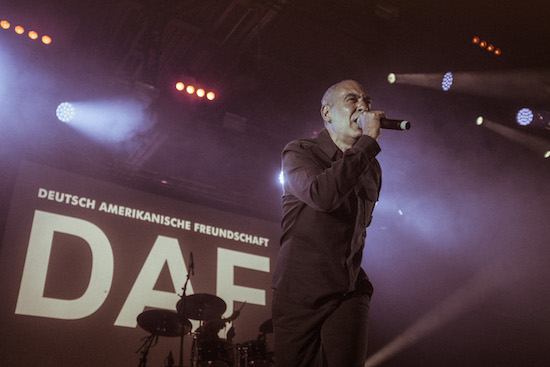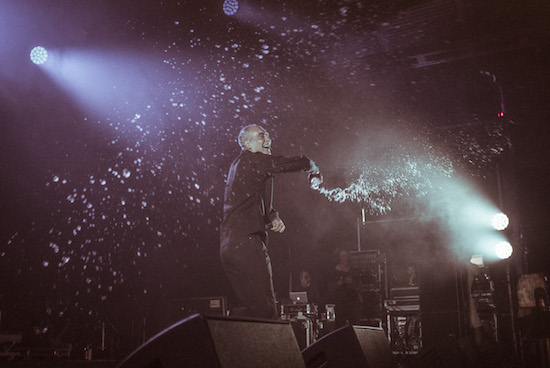The M’Era Luna festival is an annual celebration of goth, metal and industrial music held in August. Fortunately for the well-clad goths, these are the dismal depths of summer, with slate-grey clouds, occasional drizzle and temperatures hovering around 17 degrees. Traipsing up its wide avenues, past the vegan stalls and medieval market, feels like walking back to the late 1980s, into a vast, muddy time capsule. In those days, goth enjoyed a hegemony over leftfield music. Its main acts – such as Fields Of The Nephilim – may have been a little naff, but its constituency was huge and formed a sort of subsidy for Melody Maker, the music paper I wrote for at the time (NME had no truck with goth). It enabled us to write at length about groups only tangentially goth, from Skinny Puppy to The Young Gods to Front Line Assembly (who are on the bill today).
I was never a goth but there’s something I love about its subculture. It was prevalent in Leeds where I grew up and, like new romanticism before it, represented a defiantly extravagant response to both the inherent dourness of the town and, more pointedly, the recession imposed upon it by the malicious, anti-industrial economic policies of the 1980s. I feel deeply at home and comfortable among goths, in their benign non-violence, their plea to be tolerated and their bravely ostentatious urge to defy the norm.
Goth was swept away almost overnight in the UK in the early 1990s. Its blackness was swiftly superseded by the shadowless blue skies and cocky, retro-normativeness of Britpop, representative of a less morbid outlook in which the conformity that comes with chanting along together in a field or stadium trumped and marginalised the big-hatted, silly-haired individualism of goth.
Goth was never truly impaled, however, and certainly not in Germany, it would seem. The T-shirts look a little faded in some cases, their owners showing the wear of middle age, but the festivalgoers at M’Era Luna are a wonderful mix of ages, styles, some clearly weekenders magnificently tarted up for the occasion in dark finery, others engaged in deep-dyed self-marginalising – semi-shaved heads, luridly coloured hair, body piercings galore.
The homegrown music, sadly, that I hear at any rate wandering around, is pretty terrible, however – a schlager take on Sisters Of Mercy in the main. Korn are headlining in the evening but I’m not here to see them, mercifully. I’m here to see Deutsch-Amerikanische Freundschaft, aka DAF, playing a rare gig together to mark Das Ist DAF, the impending box set reissue of four of their classic albums.

Comprising vocalist Gabi Delgado-López and Robert Görl (drums, electronics), DAF were formed in 1978 and on a series of three albums between 1980 and 1982 in particular (Alles Is Gut, Gold Und Liebe, Für Immer) produced a musically minimal and muscular, lyrically mischievous prototype for a host of later styles from techno to EBM. Like the krautrock generation that preceded them, they were determined to produce a music that defied Anglo-American orthodoxies and were assisted in this by producer Conny Plank, who had previously worked with Cluster and Neu.
I’m nervous, however, about how DAF will be received in this context. While researching my book Future Days, I was struck by how little young Germans knew of their extraordinary heritage, of groups like Faust, Neu, Amon Düül II, generally preferring the pesky Anglo-American orthodoxy. DAF first split almost 35 years ago, so what might young Germans make of this duo, who flirted knowingly with homoerotic imagery, the taboos of Germany’s Nazi heritage, violence and amorality, albeit with singular cunning and cutting irony?
The answer is immediately evident. DAF shriek at the crowd who pack the large hangar in which they’re playing and the crowd shriek back. Health and safety precludes the sort of moshpit in which hardcore fans used to bodyslam at their early-80s gigs but this is a young crowd who know and get DAF despite most of them not having been born when the material performed tonight was first cut. They mouth along to lyrics; when singer Gabriel Delgado-López points to them, they point right back.
The synth element of their set is of necessity taped, with Robert Görl providing the live drumkit that was always a mandatory component of their sound. ‘Greif Nach Den Sternen’ (Reach For The Stars) strikes up with a rising rumble. Delgado used to flail maniacally around the stage in his younger days as Görl kept rigid percussive order. Today he confines himself, during ‘Der Mussolini’, to striding from left to right across stage, gesticulating to the crowd like an extremely hip senior lecturer who has a uniquely powerful relationship with his students. Songs that are delivered chins-in-chest style on record are delivered here in a more impassioned, oratorical manner. Occasionally, he’ll break into Mussolini-esque body language, strutting and bringing his fist to his chest but all in a spirit of mockery and to signify how DAF deliberately harnessed the theatrical and rhetorical power of dictators to more positive ends.
The joyful, bracing rigour of DAF is enhanced by Delgado pouring bottle after bottle of cold water over himself as he plays, on what is not a hot day, before spraying it over the crowd. DAF are no longer young men but this is indubitably youth music. ‘Verschwende Deine Jugend’ (Waste Your Youth) makes the strongest connection. The title is quintessential DAF, a sledgehammer anthem delivered with Wildean wit. As with ‘Alle Gegen Alle’ (All Against All), there is much to unpack in its terseness, matched by the whiplash intensity of Görl’s synth riffs, which impact with an almost 3D force.
DAF have said they don’t like to be too pally with fans after concerts, that they want an element of challenge and confrontation to be preserved. Yet there is a sheer elation about this gig, a sense of collective energy in which band and crowd have melded, breached the distance between floor and stage. Many of the musics DAF inspired eventually expired creatively through having become codified, repetitive (EBM, industrial), despite their apparent modernity and potency. DAF’s music, however, has proven unique and imperishable, eternally youthful. For all its oblique lyrical strategies and subtle ideology it speaks immediately to the young, whose straits are now as desperate as they have been since the second world war, in its sheer, sardonic velocity. It is the music the kids of 2017 deserve.
Photos courtesy of Christoph Eisenmenger


